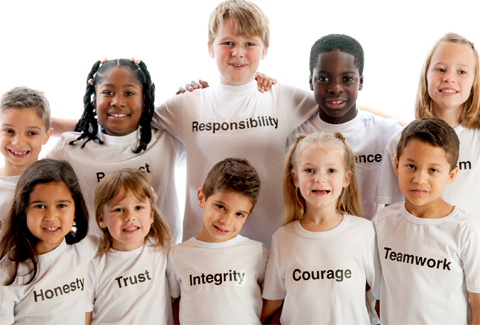“A tree is identified by its fruit. If a tree is good, its fruit will be good. If a tree is bad, its fruit will be bad” (Matthew 12:33).
How Kids Think
Some people challenge established Christian virtues. They ask, “Why value a righteous lifestyle?” Many children grow up without the benefit of role models who exhibit positive character traits. As a result, qualities such as honesty, diligence, and respect are in short supply. Homes and schools do not necessarily reinforce those basic values.
God’s Wisdom
“Character” describes who we really are, the person we choose to be. Jesus modeled character traits all Christians can develop. We build character through thousands of choices—one decision at a time. Outside, everyone can see our attitudes and actions (that build our reputation). Inside, only God knows our hidden thoughts and dreams. When trials or new challenges come, our true character is revealed. “A good man brings good things out of the good stored up in his heart, and an evil man brings evil things out of the evil stored up in his heart. For the mouth speaks what the heart is full of” (Luke 6:45).
True Story
As a child, I loved to write plays. You could tell what I was reading at the time—storylines from Boxcar Children, Hardy Boys, Chronicles of Narnia, and Frank Peretti Kids Adventures made their way into my plays. After the new script was written, the kids in our neighborhood would act them out—mysteries were solved, new lands discovered, archeological artifacts unearthed, and unusual creatures created. Without fail, the characters in my stories were ordinary people who consistently showed the character trait of bravery. Against all odds, when hope seemed dimmest the main character rallied courage and took action, overcoming the obstacles. Even when the bad guy was lying, cheating or stealing, or when the main character was captured and the situation looked bleak, he or she always found a way to take action and rise above the difficulties.
As an eight year old, I saw and admired the character traits of bravery and courage. I wanted to be heroic, overcome odds, and do the right thing—even when it was challenging. I esteemed this character trait, but I didn’t know how to become brave. I thought that a person was born with courage, or perhaps these traits just appeared along with adulthood. It wasn’t until years later that I discovered what it meant to live out bravery. Many, little, daily choices enable one to make courageous choices when trials come.
Children admire heroes with character traits worth emulating. Yet kids may not realize that they can begin to model those characteristics now. With guidance, coaching, and encouragement, children can grasp what it takes to live out virtuous character traits amidst their daily routines.
Learning Diligence
Each Sunday, Denise’s 3-5-year-old class made a big mess. Blocks were everywhere, trains piled in the corner, and dress-up clothes were strewn about. The play area was typically used only during free playtime, then the class moved to a different part of the room for circle time, snack, story time, and crafts. Several weeks in a row, the kids worked longer on their craft and they didn’t have free playtime at the end. As a result, they didn’t clean up the classroom.
After spending several weeks cleaning up the whole classroom solo, Denise realized she needed to value giving the children the opportunity to be diligent with cleanup tasks. The activities were valuable, but with just a little bit of planning, she could guard that time at the end. The next week, it was tough to motivate the children to clean at the end of class. They wanted to play until the very last second; cleaning was not something this group collectively was in the habit of doing. Denise stuck with the process and enthusiastically sang the cleanup song when it was time to start picking up. Before long the children joined in; they learned where the toys went, and with many little directives the job was done. As the weeks progressed, the kids learned the routine and stopped grumbling.
Soon the children proudly showed Denise how quickly they could clean up an area—and she profusely praised them for a job well done. The time spent cultivating diligence cleaning up the classroom was worth it! Denise realized if she didn’t value cultivating character traits in her class and leave space to learn to make positive choices, the children would not learn on their own. For these precious kids, coaching and instruction were essential to help build character-based habits!
What You Can Do
- Download the simple chart with eleven “Character Traits”
- Explain each character trait to your child and look up the Bible verses that describe it.
- Give personal examples of each character trait; use your life experiences.
- Make use of the chart in your home with an individual child, or in your classroom to assess the group.
- When a child reflects one of these characteristics, draw a “happy face” beside it on the chart. If your child “misses the mark,” sit down together and talk about it privately.
__
Discipleship Begins With Our Children
Children need meaningful, shared-life relationships. That’s the heart of discipleship. DiscipleLand’s family of Biblical resources forms a complete Children’s Discipleship System™ – an intentional, relational, and transformational process designed to help children know God intimately, love Him passionately, and to serve Him selflessly. Click here for your Free Catalog
Learn more by clicking on the following:
• Samples
• Nursery and Toddler
• Preschool
• Kindergarten
• Elementary
• Kids Church
• Midweek
• Free Catalog








Please send us a catalog!
Zweites Haus School of Wimberley 1500 Fischer Store Road Wimberley, TX 78676
THANK YOU! bds